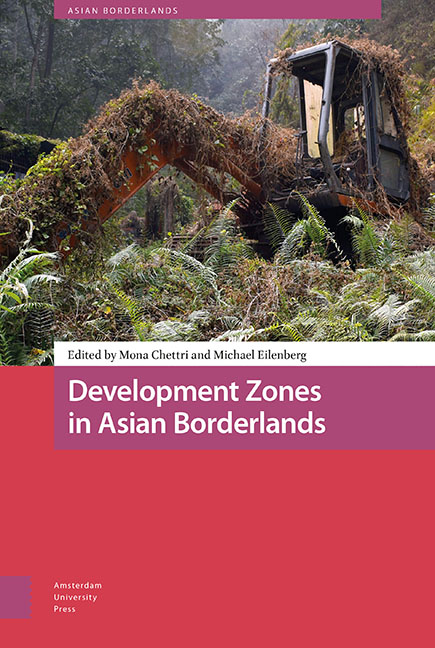Book contents
- Frontmatter
- Contents
- List of Figures and Tables
- Acknowledgements
- Introduction: Enclave Development and Socio-spatial Transformations in Asian Borderlands
- 1 Post-disaster Development Zones and Dry Ports as Geopolitical Infrastructures in Nepal
- 2 Onwards and Upwards: Aerial Development Zones in Nepal
- 3 Casinos as Special Zones: Speculative Development on the Nation’s Edge
- 4 Thinking the Zone: Development, Climate, and Heterodystopia
- 5 From Shangri-La to De facto SEZ: Land Grabs from “Below” in Sikkim, India
- 6 Development Zones in Conflict-Affected Borderlands: The Case of Muse, Northern Shan State, Myanmar
- 7 Smart Enclaves in the Borderland: Digital Obligations in Northeast India
- 8 Post-Disaster Economies at the Margins: Development, Profit, and Insecurities Across Nepal’s Northern Borderlands
- 9 Development from the Margins: Failing Zones and Suspended Development in an Indonesian Border Village
- 10 From Boom to Bust – to Boom Again?: Infrastructural Suspension and the Making of a Development Zone at the China-Laos Borderlands
- 11 Genealogies of Extraction: De Facto Development Zones in the Indonesian Borderlands
- Notes on Contributors
- Index
6 - Development Zones in Conflict-Affected Borderlands: The Case of Muse, Northern Shan State, Myanmar
Published online by Cambridge University Press: 18 June 2021
- Frontmatter
- Contents
- List of Figures and Tables
- Acknowledgements
- Introduction: Enclave Development and Socio-spatial Transformations in Asian Borderlands
- 1 Post-disaster Development Zones and Dry Ports as Geopolitical Infrastructures in Nepal
- 2 Onwards and Upwards: Aerial Development Zones in Nepal
- 3 Casinos as Special Zones: Speculative Development on the Nation’s Edge
- 4 Thinking the Zone: Development, Climate, and Heterodystopia
- 5 From Shangri-La to De facto SEZ: Land Grabs from “Below” in Sikkim, India
- 6 Development Zones in Conflict-Affected Borderlands: The Case of Muse, Northern Shan State, Myanmar
- 7 Smart Enclaves in the Borderland: Digital Obligations in Northeast India
- 8 Post-Disaster Economies at the Margins: Development, Profit, and Insecurities Across Nepal’s Northern Borderlands
- 9 Development from the Margins: Failing Zones and Suspended Development in an Indonesian Border Village
- 10 From Boom to Bust – to Boom Again?: Infrastructural Suspension and the Making of a Development Zone at the China-Laos Borderlands
- 11 Genealogies of Extraction: De Facto Development Zones in the Indonesian Borderlands
- Notes on Contributors
- Index
Summary
Abstract
How are development zones “made” in conflict-affected borderlands? Addressing this question, this chapter explores the transformation of the Myanmar-China border town of Muse since 1988. Despite ongoing armed conflict in northern Myanmar, Muse has become the country’s most important border development zone and today handles more than 80% of licit overland Myanmar-China trade. It is also a key border hub in China's Belt and Road Initiative. Policy narratives typically claim that borderland development and regional economic integration offer an antidote to violence, criminality, and illegal practices. This chapter challenges these narratives. It demonstrates how long-standing forms of informal public authority and illegality have become deeply embedded in the technologies of governance that have underpinned Muse's rise.
Keywords: illicit economies, borderland development, informal governance, militias, illegal drugs, Belt and Road Initiative
Informal Governance and Illegality in the Making of Borderland Development Zones
Since the late 1980s, borderland regions across Southeast Asia have increasingly been reimagined as zones of economic opportunity that have the potential to stimulate national and regional development. Development discourses have promoted the “opening up” of “marginal” spaces to markets and capital alongside political projects aimed at consolidating state control over territories where the reach of the state has historically been weak and contested. Borderlands have become the subject of concerted efforts by national governments to expand cross-border flows of trade and investment and convert borderland spaces into sites of resource extraction and production (Barney 2009; Eilenberg 2012; Eilenberg 2014; Nyíri 2012; Taylor 2016; Woods 2011; van Schendel and de Maaker 2014). However, in many parts of Southeast Asia the rise of borderland development zones is being mapped onto long-standing histories of unresolved armed conflict, fragmented sovereignty, and illegal cross-border flows. How are development zones “made” in conflict-affected borderlands? What forms of territorialisation underpin the making of development zones in these contested spaces? What forms of public authority emerge to govern borderland development zones and whose interests do they serve? And how do long-standing histories of illicit border trade, fragmented sovereignty, and unresolved armed conflicts shape governance structures and everyday life in these development zones?
This chapter sets out to address these questions by analysing the rise of the Myanmar-China border town of Muse in northern Shan State in the period since the late 1980s and current plans to establish Myanmar's first official border special economic zone (SEZ) in the city.
- Type
- Chapter
- Information
- Development Zones in Asian Borderlands , pp. 141 - 164Publisher: Amsterdam University PressPrint publication year: 2021



